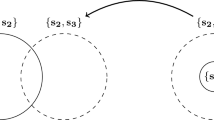Abstract
We define an optimal Bayesian knowledge-seeking agent, KL-KSA, designed for countable hypothesis classes of stochastic environments and whose goal is to gather as much information about the unknown world as possible. Although this agent works for arbitrary countable classes and priors, we focus on the especially interesting case where all stochastic computable environments are considered and the prior is based on Solomonoff’s universal prior. Among other properties, we show that KL-KSA learns the true environment in the sense that it learns to predict the consequences of actions it does not take. We show that it does not consider noise to be information and avoids taking actions leading to inescapable traps. We also present a variety of toy experiments demonstrating that KL-KSA behaves according to expectation.
Access this chapter
Tax calculation will be finalised at checkout
Purchases are for personal use only
Preview
Unable to display preview. Download preview PDF.
Similar content being viewed by others
References
Baranes, A., Oudeyer, P.-Y.: Active Learning of Inverse Models with Intrinsically Motivated Goal Exploration in Robots. Robotics and Autonomous Systems 61(1), 69–73 (2013)
Hutter, M.: Universal Artificial Intelligence: Sequential Decisions based on Algorithmic Probability. Springer (2005)
Lattimore, T., Hutter, M.: Asymptotically optimal agents. In: Kivinen, J., Szepesvári, C., Ukkonen, E., Zeugmann, T. (eds.) ALT 2011. LNCS, vol. 6925, pp. 368–382. Springer, Heidelberg (2011)
Lattimore, T., Hutter, M.: Time Consistent Discounting. In: Kivinen, J., Szepesvári, C., Ukkonen, E., Zeugmann, T. (eds.) ALT 2011. LNCS, vol. 6925, pp. 383–397. Springer, Heidelberg (2011)
Li, M., Vitányi, P.M.B.: An Introduction to Kolmogorov Complexity and Its Applications, 3rd edn. Springer, New York (2008)
Orseau, L.: Universal Knowledge-Seeking Agents. In: Kivinen, J., Szepesvári, C., Ukkonen, E., Zeugmann, T. (eds.) ALT 2011. LNCS, vol. 6925, pp. 353–367. Springer, Heidelberg (2011)
Orseau, L.: Asymptotic non-learnability of universal agents with computable horizon functions. Theoretical Computer Science 473, 149–156 (2013)
Rathmanner, S., Hutter, M.: A philosophical treatise of universal induction. Entropy 13(6), 1076–1136 (2011)
Sutton, R., Barto, A.G.: Reinforcement Learning: An Introduction. MIT Press, Cambridge (1998)
Schmidhuber, J.: Developmental robotics, optimal artificial curiosity, creativity, music, and the fine arts. Connection Science 18(2), 173–188 (2006)
Sun, Y., Gomez, F., Schmidhuber, J.: Planning to Be Surprised: Optimal Bayesian Exploration in Dynamic Environments. In: Schmidhuber, J., Thórisson, K.R., Looks, M. (eds.) AGI 2011. LNCS, vol. 6830, pp. 41–51. Springer, Heidelberg (2011)
Storck, J., Hochreiter, S., Schmidhuber, J.: Reinforcement driven information acquisition in non-deterministic environments. In: Proceedings of the International Conference on Artificial Neural Networks, Paris, vol. 2, pp. 159–164. EC2 & Cie (1995)
Solomonoff, R.: Complexity-based induction systems: comparisons and convergence theorems. IEEE Transactions on Information Theory 24(4), 422–432 (1978)
Author information
Authors and Affiliations
Editor information
Editors and Affiliations
Rights and permissions
Copyright information
© 2013 Springer-Verlag Berlin Heidelberg
About this paper
Cite this paper
Orseau, L., Lattimore, T., Hutter, M. (2013). Universal Knowledge-Seeking Agents for Stochastic Environments. In: Jain, S., Munos, R., Stephan, F., Zeugmann, T. (eds) Algorithmic Learning Theory. ALT 2013. Lecture Notes in Computer Science(), vol 8139. Springer, Berlin, Heidelberg. https://doi.org/10.1007/978-3-642-40935-6_12
Download citation
DOI: https://doi.org/10.1007/978-3-642-40935-6_12
Publisher Name: Springer, Berlin, Heidelberg
Print ISBN: 978-3-642-40934-9
Online ISBN: 978-3-642-40935-6
eBook Packages: Computer ScienceComputer Science (R0)




